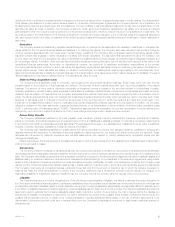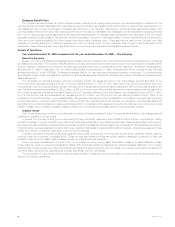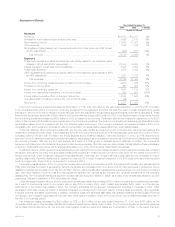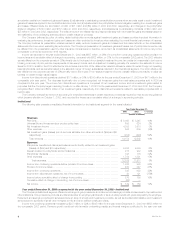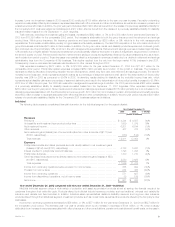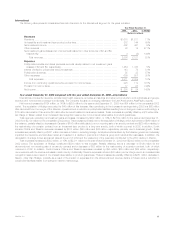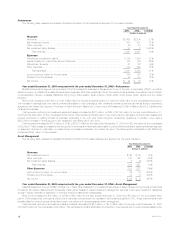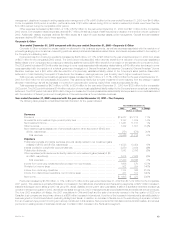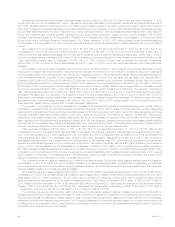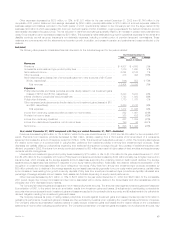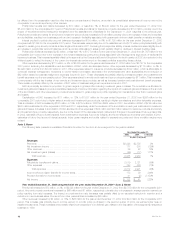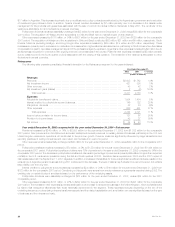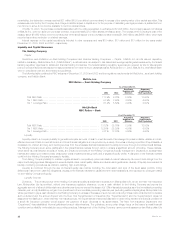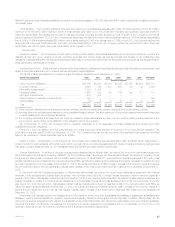MetLife 2003 Annual Report Download - page 18
Download and view the complete annual report
Please find page 18 of the 2003 MetLife annual report below. You can navigate through the pages in the report by either clicking on the pages listed below, or by using the keyword search tool below to find specific information within the annual report.Policyholder benefits and claims increased by $1,069 million, or 6%, to $19,523 million for the year ended December 31, 2002 from $18,454 million
for the comparable 2001 period. This variance is attributable to increases in the International, Institutional and Reinsurance segments, partially offset by a
decrease in the Auto & Home segment. A $699 million increase in International is primarily due to the acquisition of Hidalgo, the acquisitions in Chile and
Brazil, the aforementioned sale of an annuity contract, the restructuring of a Canadian pension contract and business growth in South Korea, Mexico
(excluding Hidalgo) and Taiwan. An increase in Institutional of $415 million is commensurate with the growth in premiums as discussed above, largely
offset by the establishment of a liability in 2001 related to the September 11, 2001 tragedies and the 2001 fourth quarter business realignment initiatives.
An increase in Reinsurance of $70 million is commensurate with the growth in premiums discussed above. These increases were partially offset by a
decrease of $102 million in the Auto & Home segment. The variance in Auto & Home is largely due to improved claim frequency resulting from milder
winter weather, lower catastrophe levels and fewer personal umbrella claims, partially offset by an increase in current year bodily injury and no-fault
severities and costs associated with the processing of the New York assigned risk business.
Interest credited to policyholder account balances decreased by $134 million, or 4%, to $2,950 million for the year ended December 31, 2002 from
$3,084 million for the comparable 2001 period. This variance is attributable to decreases in the Individual and Institutional segments, partially offset by
increases in the International and Reinsurance segments. A $105 million decrease in Individual is primarily due to the establishment in 2001 of a
policyholder liability with respect to certain group annuity contracts at New England Financial. Excluding this policyholder liability, interest credited expense
increased slightly in response to an increase in policyholder account balances, which is primarily attributable to sales growth despite declines in interest
crediting rates. An $81 million decrease in Institutional is primarily due to a decline in average crediting rates resulting from the current interest rate
environment. These variances are partially offset by a net increase of $28 million in International. This increase is principally due to the acquisition of
Hidalgo, partially offset by a reduction in the number of investment-type policies in-force in Argentina. In addition, a $24 million increase in Reinsurance is
primarily due to several new annuity reinsurance agreements executed during 2002.
Policyholder dividends decreased by $144 million, or 7%, to $1,942 million for the year ended December 31, 2002 from $2,086 million for the
comparable 2001 period. This variance is attributable to a decrease in the Institutional segment resulting from unfavorable mortality experience of several
large group clients. Institutional policyholder dividends vary from period to period based on participating contract experience, which is recorded in
policyholder benefits and claims.
Other expenses decreased by $7 million, or less than 1%, to $7,015 million for the year ended December 31, 2002 from $7,022 million for the
comparable 2001 period. Excluding the capitalization and amortization of DAC, which are discussed below, other expenses increased by $68 million, or
1%, to $7,716 million in 2002 from $7,648 million in 2001. Excluding the capitalization and amortization of DAC and the change in accounting as
prescribed by Statement of Financial Accounting Standards (‘‘SFAS’’) No. 142, Goodwill and Other Intangible Assets, (‘‘SFAS 142’’), which eliminates the
amortization of goodwill and certain other intangibles, other expenses increased by $115 million. This variance is primarily attributable to increases in the
Reinsurance and International segments, as well as in Corporate & Other, partially offset by decreases in the Institutional, Individual and Asset
Management segments. A $209 million increase in Reinsurance is primarily attributable to increases in allowances paid, primarily driven by high-
allowance business in the United Kingdom along with strong growth in the U.S. and Asia/Pacific regions. An increase of $166 million in International
expenses is primarily due to the acquisition of Hidalgo, the acquisitions in Chile and Brazil, as well as business growth in South Korea, Mexico (excluding
Hidalgo), and Hong Kong. An increase in Corporate & Other of $65 million is primarily due to increases in legal and interest expenses. The 2002 period
includes a $266 million charge to increase the Company’s asbestos-related liability, expenses to cover costs associated with the resolution of federal
government investigations of General American’s former Medicare business and a reduction of a previously established liability related to the Company’s
sales practices class action settlement. The 2001 period includes a $250 million charge recorded in the fourth quarter of 2001 to cover costs associated
with the resolution of class action lawsuits and a regulatory inquiry pending against Metropolitan Life involving alleged race-conscious insurance
underwriting practices prior to 1973. The increase in interest expenses is primarily due to increases in long-term debt resulting from the issuance of
$1.25 billion and $1 billion of senior debt in November 2001 and December 2002, respectively, partially offset by a decrease in commercial paper in
2002. In addition, a decrease in the elimination of intersegment activity contributed to the variance. A decrease of $181 million in Institutional is due to
higher expenses resulting from the business realignment initiatives accrual in the fourth quarter 2001 (primarily the Company’s exit from the large market
401(k) business), $30 million of which was released into income in the fourth quarter of 2002. This decrease is partially offset by an increase in 2002
operational expenses for dental and disability and group insurance’s non-deferrable expenses commensurate with the aforementioned premium growth,
as well as higher pension and postretirement benefit expenses. A decrease of $105 million in Individual is due to continued expense management
initiatives, including reduced compensation-related expenses, a decline in business realignment expenses that were incurred in 2001 and reductions in
volume-related commission expenses in the broker/dealer and other subsidiaries. These declines are partially offset by higher pension and postretirement
benefit expenses and an increase in expenses stemming from sales growth in new annuity and investment-type products. In addition, a decrease of
$39 million in Asset Management is primarily due to the sale of Conning in July 2001.
DAC is principally amortized in proportion to gross margins and profits, including investment gains or losses. The amortization is allocated to
investment gains and losses to provide consolidated statement of income information regarding the impact of investment gains and losses on the amount
of the amortization, and other expenses to provide amounts related to gross margins and profits originating from transactions other than investment gains
and losses.
Capitalization of DAC increased by $301 million, or 15%, to $2,340 million for the year ended December 31, 2002 from $2,039 million for the
comparable 2001 period. This variance is primarily due to increases in the Reinsurance, Individual, International and Institutional segments. A $125 million
increase in Reinsurance is commensurate with the increase in allowances paid. A $111 million increase in Individual is due to higher sales of annuity and
investment-type products, resulting in higher commissions and other deferrable expenses. A $51 million increase in International is primarily due to the
2002 acquisition of Hidalgo and overall business growth in South Korea, partially offset by a decrease in Argentina due to the reduction in business
caused by the overall economic environment. A $22 million increase in Institutional is primarily due to growth in sales commissions and fees for disability
products sold by Institutional. Total amortization of DAC increased by $206 million, or 14%, to $1,644 million in 2002 from $1,438 million in 2001.
Amortization of DAC of $1,639 million and $1,413 million are allocated to other expenses in 2002 and 2001, respectively, while the remainder of the
amortization in each period is allocated to investment gains and losses. The increase in amortization allocated to other expenses is attributable to
increases in the Individual, International and Reinsurance segments. An increase of $111 million in Individual is due to the impact of the depressed equity
markets and changes in the estimates of future gross profits. In 2002, estimates of future dividend scales, future maintenance expenses, future rider
margins, and future reinsurance recoveries were revised. In 2001, estimates of future fixed account interest spreads, future gross margins and profits
related to separate accounts and future mortality margins were revised. An increase in International of $64 million is primarily due to loss recognition in
Argentina as a result of the economic environment, primarily the devaluation of its currency. The remaining increase was due to new business in South
MetLife, Inc. 15


